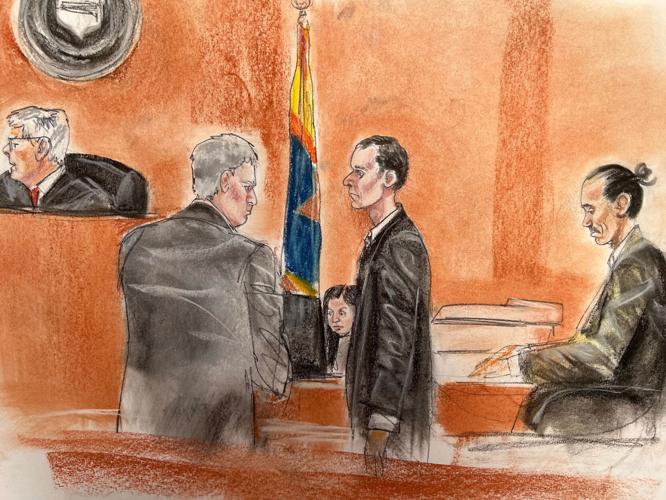Six-year-old Isabel Celis suffered a vertebral fracture that likely injured her spinal cord at or near the time of her death, an expert witness for the prosecution told jurors Friday.
Christopher Matthew Clements, 41, is on trial on charges of kidnapping, first-degree murder and burglary in the Tucson child’s death. He was convicted last year in the separate, 2014 killing of a 13-year-old Tucson girl, Maribel Gonzalez.
Isabel was discovered missing from her bedroom the morning of April 21, 2012. Clements wasn’t identified as a suspect until 2017, when he led authorities to Isabel’s remains in exchange for the dropping of unrelated charges that had landed him in jail.
Dr. Jennifer Chen, a forensic pathologist with the Pima County Medical Examiner’s Office, told the jury that Isabel’s cause of death was homicide by unspecified means, which is not an uncommon finding in cases that involve skeletal remains.
“In most cases where we have a complete body to examine, cause of death is able to be determined,” she said, adding that when there is less to work with, they can’t always make a determination.
Chen said the trauma was to Isabel’s first thoracic vertebra, located at the base of the neck and top of the chest. She said there was a fracture through the vertebra without evidence of healing, meaning she was not alive long enough for the bone to start showing signs of healing.
“I believe it probably would have caused injury to the spinal cord,” Chen said. “To what degree, I can’t say without a complete autopsy.”
Chen said a fracture to that area would have likely caused some hemorrhage into the surrounding soft tissue and inflammation, but she was not able to be more specific based on just skeletal remains.
The determination of homicide was based on the evidence of trauma, as well as the suspicious circumstance surrounding Isabel’s death, Chen said.
“The remains were found a great distance from her home, in a remote area with heavy brush and cover,” she said.
Photos of girls found on Clements’ devices
Clements’ ex-girlfriend, Melissa Stark, took the stand Thursday and Friday. She was involved with Clements from 2013 through 2020.
Stark told jurors that in 2017 she received a call from Clements from the Pima County jail, where he was incarcerated. He told her to go to the tree in their front yard and look around the rocks, saying she would find some “information.”
Stark said she found a plastic bag with a small piece of paper inside with “Isabel Celis” written on it in Clements’ handwriting.
She said Clements had mentioned Isabel one time in the past, when he told her about a time police came by to ask him questions about her disappearance. In the weeks following Isabel’s disappearance, police went door-to-door in nearby neighborhoods seeking out witnesses and information.
Clements told her to call the FBI and say he had information about the case, Stark said.
Stark denied having anything to do with a folder called “My secret apps” found on of the electronic devices taken from their home after Clements was identified as a suspect.
Deputy Pima County Attorney Tracy Miller showed Stark and the jury dozens of photos from the folder, many of scantily-clad young girls and others of girls playing that appeared to have been photographed over a fence. Among them, Miller showed 11 photos of the same girl outside of a home. Stark told Miller she didn’t know the girl and had never seen the photos.
Stark said she didn’t recognize any of the girls in the photos, but she did recognize the interior of Clements’ car in a series of photos of young, dark-haired girls taken from inside the vehicle.
She told jurors she did not download or take the pictures of the girls found on Clements’ iPad. She also said she did not run internet searches on Celis’ name on their devices.
Only Clements and she knew the passcodes of their electronic devices, she said, adding he wouldn’t let other people touch them.
After Stark called the FBI for him in 2017, she said he told her to destroy the evidence. She said she tore up the piece of paper and flushed it down the toilet.
Police: Father showed little emotion
Tucson police detective Eddie Orozco told jurors about searching the desert area where Isabel’s remains were found for additional evidence. Authorities cleared over-brush, moved branches and removed grass before performing a hands-and-knees search.
During cross examination, Clements’ defense attorney, Eric Kessler, asked Orozco about Sergio Celis’ behavior when police went to tell him they had identified his daughter’s remains.
Orozco confirmed that Celis didn’t show any emotion until he became “anxious” after learning his meeting with police would interfere with an opera performance.
Orozco also said Celis told them he was surprised, because he had thought Isabel was in Mexico.
But under questioning later by Deputy Pima County Attorney Chris Ward, Orozco said Celis’ reaction was not “wildly irregular” compared to other notifications.
“In my 11 years working in homicide, I’ve seen people react to notifications from no emotion to hysterical,” the detective said.





